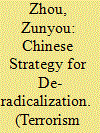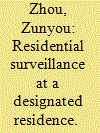| Srl | Item |
| 1 |
ID:
169928


|
|
|
|
|
| Summary/Abstract |
China is fighting a tough battle against separatist terrorism perpetrated by militant Muslim Uyghurs in the far-western region of Xinjiang. De-radicalization is one of the policies the authorities in Xinjiang have recently taken to address the upsurge in terrorist violence. This paper consists of five parts. The first part deals with the background against which the de-radicalization strategy was conceived and developed. The second part discusses several major approaches to the strategy such as “five keys,” “four prongs,” “three contingents,” “two hands,” and “one rule.” The third part presents custodial, post-imprisonment, and social programs for targeting three groups of people: imprisoned radicals, released radicals, as well as those who are radicalized but not prosecuted. The fourth part describes programs for engaging communities in order to win over politically reliable people from civil society for support in de-radicalization. The last part draws a conclusion regarding the characteristics of, effectiveness of, controversies over, and future of the Chinese de-radicalization campaign.
|
|
|
|
|
|
|
|
|
|
|
|
|
|
|
|
| 2 |
ID:
178709


|
|
|
|
|
| Summary/Abstract |
In China, ‘residential surveillance at a designated residence,’ as provided by its current Criminal Procedure Law, is a special form of pre-trial detention designed allegedly as a non-custodial measure to reduce the rate of pre-trial custody. However, legal provisions concerning this measure tacitly allow suspects to be held incommunicado for up to six months without access to relatives and lawyers. The measure is also highly problematic in legal practice, because it often acts as a convenient tool for bypassing regular legal safeguards. ‘Residential surveillance at a designated residence’ is very similar to two other measures—‘shuanggui’ and ‘liuzhi’—with Chinese characteristics. The repressive detention measure stains China's struggle for the rule of law.
|
|
|
|
|
|
|
|
|
|
|
|
|
|
|
|